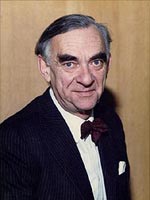 Perhaps foreshadowing our own information age, World War II’s “Battle of the Atlantic” between German submarine wolf-packs and Allied convoys was largely won and nearly lost by the code breakers of Bletchley Park. In 1940, Alan Turing had begun to break the German Navy’s “Dolphin” cipher which was based on an Engima code machine with three encoding rotors. Within a little over a year the German wolf-packs were temporarily withdrawn due to mounting submarine losses. In 1942, however the Germans introduced a new four rotor Engima machine using what was termed the “Shark” cipher. Richard Pendered and a small team of codebreakers would finally break the “Shark” cipher ending a ten month period of major Allied convoy losses in what those in Bletchely Park referred to as the “Shark blackout.”
Perhaps foreshadowing our own information age, World War II’s “Battle of the Atlantic” between German submarine wolf-packs and Allied convoys was largely won and nearly lost by the code breakers of Bletchley Park. In 1940, Alan Turing had begun to break the German Navy’s “Dolphin” cipher which was based on an Engima code machine with three encoding rotors. Within a little over a year the German wolf-packs were temporarily withdrawn due to mounting submarine losses. In 1942, however the Germans introduced a new four rotor Engima machine using what was termed the “Shark” cipher. Richard Pendered and a small team of codebreakers would finally break the “Shark” cipher ending a ten month period of major Allied convoy losses in what those in Bletchely Park referred to as the “Shark blackout.”
Richard Pendered, who has died aged 89, was one of the small team of Bletchley Park codebreakers who broke the “Shark” Enigma cipher used by German U-boats during the Second World War; his work also led directly to the sinking of the battlecruiser Scharnhorst.
By November 1942, with the wolf packs sinking ever increasing numbers of Allied ships and the codebreakers working night and day to try to find a solution, tempers became frayed. The Admiralty sent Hut 8 a tersely written memorandum, urging it to pay “a little more attention” to Shark and complaining that the Battle of the Atlantic was the only area where Bletchley was having no impact.
Then a “pinch” of two “short signal” codebooks, captured by the Royal Navy destroyer Petard off Egypt, allowed the codebreakers back in. It was a vital breakthrough, to which Pendered contributed with what Hugh Alexander called “notable individual feats”. So useful had Pendered become to Hut 8 that he was retained throughout the war to work on Germany’s more sophisticated Enigma ciphers.
On Boxing Day [in 1943], Pendered deciphered a message which located the German battlecruiser Scharnhorst off Lopphavet in Norway. She was surrounded and sunk later that day. Assisted by the introduction of more sophisticated American bombes, Hut 8 was by this time completely on top of German naval codes and for the last year of the war Pendered was one of just four codebreakers working in Hut 8.
Richard Geoffrey Pendered was born at Wellingborough, Northamptonshire, on September 26 1921, the only son of Richard Dudley Pendered, known as Dudley, who worked for the family firm of surveyors and auctioneers.
After the war, Pendered briefly continued to work as a codebreaker before going to work for the grain trading and processing company Bunge and Co, where he became managing director. He was a keen tennis and squash player, and represented Northamptonshire at both sports.
He married, in 1953, Jennifer Mead, who had represented England at squash. His twin sisters, Gill and Ann, also worked in Hut 8, although not as codebreakers.
